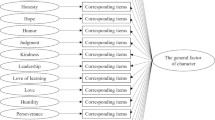Abstract
We investigated cultural influences on the distribution of character strengths, gender differences in character strengths, and the relationship of happiness to character strengths. Young adults from the United States (n=1099) and Japan (n=308) completed the English or Japanese versions of the Values in Action Inventory of Strengths. American and Japanese showed similar distributions of the 24 strengths measured: Higher strengths included love, humor and kindness, and lesser strengths included prudence, self-regulation, and modesty. Gender differences across cultures were also similar: Females were more likely than males to report strengths of love and kindness, whereas males were more likely to report bravery and creativity. In both samples, associations with happiness were found for zest, hope, curiosity and gratitude. The present study is a first step in an international study of character strengths, and we discuss the ubiquity and variation of character across culture.
Similar content being viewed by others
References
E. Diener S. Oishi R.E. Lucas (2003) ArticleTitle‘Personality, culture, and subjective well-being: Emotional and cognitive evaluations of life’ Annual Review of Psychology 54 403–425 Occurrence Handle10.1146/annurev.psych.54.101601.145056
R. Emmons C.A. Crumpler (2000) ArticleTitle‘Gratitude as human strength: Appraising the evidence’ Journal of Social and Clinical Psychology 19 56–69
S. Kitayama H.R. Markus (2000) The pursuit of happiness and realization of sympathy: Cultural pattern of self, social relations, and well-being E. Diener E.M. Suh (Eds) Culture and Subjective Well-being MIT Press Cambridge, MA 113–161
S. Kitayama H.R. Markus M. Kurokawa (2000) ArticleTitle‘Culture, emotion, and well-being: Good feelings in Japan and the United States’ Cognition and Emotion 14 93–124 Occurrence Handle10.1080/026999300379003
S. Lyubomirsky H.S. Lepper (1999) ArticleTitle‘A measure of subjective happiness: Preliminary reliability and construct validation’ Social Indicator Research 46 137–155 Occurrence Handle10.1023/A:1006824100041
L. Lu R. Gilmour S. Kao (2001) ArticleTitle‘Cultural values and happiness: An east–west dialogue’ The Journal of Social Psychology 141 477–493 Occurrence Handle10.1080/00224540109600566
M.E. McCullough W.T. Hoyt D.B. Larson H.G. Koenig C. Thoresen (2000) ArticleTitle‘Religious involvement and mortality: A meta-analytic review’ Health Psychology 19 211–222 Occurrence Handle10.1037/0278-6133.19.3.211
W.I. Miller (2000) The Mystery of Courage Harvard University Press Cambridge Massachusetts
Otake, K., S. Shimai, N. Utsuki, A. Ikemi, C. Peterson and M.E.P. Seligman: 2003, October 3, Development of the Japanese version of the Values in Action (VIA) Strengths Scale: Validity and reliability. Poster presented at the Second International Positive Psychology Summit, Washington, DC
N. Park C. Peterson M.E.P. Seligman (2004) ArticleTitle‘Strengths of character and well-being’ Journal of Social and Clinical Psychology 23 603–619 Occurrence Handle10.1521/jscp.23.5.603.50748
C. Peterson N. Park M.E.P. Seligman (2005) Assessment of character strengths G.P. Koocher , J.C. Norcross S.S. Hill SuffixIII (Eds) Psychologists’ Desk Reference EditionNumber2 Oxford University Press New York 93–98
C. Peterson M.E.P. Seligman (2004) Character Strengths and Virtues: A Classification and Handbook Oxford University Press New York
P. Rozin (2003) ArticleTitle‘Five potential principles for understanding cultural differences in relation to individual differences’ Journal of Research in Personality 37 273–283 Occurrence Handle10.1016/S0092-6566(02)00566-4
M.E.P. Seligman (2002) Authentic Happiness Free Press New York
M.E.P. Seligman M. Csikszentmihalyi (2000) ArticleTitle‘Positive psychology: An introduction’ American Psychologist 55 5–14 Occurrence Handle10.1037/0003-066X.55.1.5
S. Shimai K. Otake N. Utsuki A. Ikemi S. Lyubomirsky (2004) ArticleTitle‘Development of Japanese Subjective Happiness Scale (SHS) and its validity and reliability’ Japanese Journal of Public Health 51 845–853
J. Stoppard C.D. Gruchy (1993) ArticleTitle‘Gender, context, and expression of positive emotion’ Personality and Social Psychology Bulletin 19 143–150
Y. Sugihara E. Katsurada (2000) ArticleTitle‘Gender-role personality traits in Japanese culture’ Psychology of Women Quarterly 24 309–318 Occurrence Handle10.1111/j.1471-6402.2000.tb00213.x
J.P. Tangney (2000) ArticleTitle‘Humility: Theoretical perspectives, empirical findings and directions for future research’ Journal of Social and Clinical Psychology 19 70–82
J. Tsang M.E. McCullough (2003) Measuring religious constructs: A hierarchical approach to construct organization and scale selection Lopez (Eds) Positive Psychological Assessment: A Handbook of Models and Measures American Psychological Association Washington, DC 345–360 Occurrence Handle10.1037/10612-022



